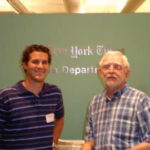Interview: How To Become a Physical Therapist
I am a physical therapist at Scottsdale Healthcare. My job title is clinical specialist.
It’s a unique position in physical therapy. Physical therapy is a broad career. We are in outpatient orthopedics area. I’m a clinical specialist because I’m board certified in orthopedics.
I know that I wanted to work in the medical field, but I also knew that I wanted to spend time with my patients. I thought that I wanted to be an orthopedic surgeon, but I felt like they see forty patients for five minutes a day. And I wanted to see more like eight patients for an hour a day. So I really get to see their improvement and get to know them. I get to see the impact that I make in their lives. That and being interested in physical fitness and sports related injuries is why I chose that field.
It’s a very science based field. I was always interested in math and science. As part of the process to get into the field, you have to volunteer at least 150 hours into the field. In the process of volunteering, I knew it was something that I really wanted to pursue. Over my college career, I ended up spending over 2,000 hours as a technician in the area. At that point, I knew it was something that I wanted to pursue and be great at.
It isn’t easy. You have to dedicate yourself. It’s a competitive area. You have to go through four year college and then apply on to physical therapy school. There’s programs now where you’re going to go to school seven or eight years. There is a commitment, but for anyone trying to get in the field, I would say that if you have a desire to work with people and really feel like you’re making an impact in their lives, this gives you an opportunity to do so. The seven or eight years you’re in school is really just a blink of an eye. That commitment is so short in comparison to the career that you’re going to have.
The physical therapy is ranked very highly in the fields that are most pleasing to the employees that work in it. If there is that desire or passion to work in that area, the schooling is just a stepping stone to a great career.
I’ve read statistics that have polled 25,000 people and they found that job satisfaction in physical therapy ranked third. What they found was that people who worked in areas that had direct contact with other people had the highest job satisfaction.
Something else that I enjoy beyond just working with people is the fact that I can leave my job at work. It allows for a great work life balance. I come to work with very set hours. I work from 7-3:30. That gives me time to still get home and have a family life. And I don’t have to worry about being on call or working odd hours or weekends. It allows me to live the life and still have the salary that I have.
Nurses could be pulling double shifts and work 24 hours in a row. Doctors are on call and need to be available to go to the emergency room. As a physical therapist, we get to work daylight hours and work a set schedule. We may get called in on a day where we might be short a person, but beyond that, we know when we work and what’s expected of us.
Students once they’ve been through school, they have a good understanding of the clinical aspect of their job. But there’s things about insurance authorization, or the documentation, or the resources in the community to spend time with to give them the care they need.
Everyone has their own thing that will motivate them. I think the secret to motivating somebody is really finding out what’s important to them. Sometimes it’s quite easy when a worker has come in and they’re about ready to lose their job, or they need to make their mortgage for the month. Their incentive is to get back to work. So it’s very easy to motivate them. Same thing with an athlete. A person that has injured their back and hasn’t exercised for 2 or 3 years, pain is obviously a motivator, but we have to figure out what’s important to them. What is it that you want to return to? What’s important to you in your life?
Once we figure that out, we can tailor our treatments to help them get back to where they want to be. It’s really looking at an outcome.
Trust is very, very important. I think we spend our entire first treatment building that trust. It begins with how we even address ourselves in the lobby. When we go up and introduce ourselves to someone, it’s always by first and last name. ‘I’ll be your physical therapist today. What may I call you?’
It just shows a level of respect. And really listening to the person. When they’ve gone to an emergency care center, or when they’ve gone to see a care physician, I think patients sometimes feel like they’re really been listened to. If you listen hard enough, a patient will tell you what’s wrong with them. By our interview process, the first twenty or thirty minutes we spend with a patient is really getting to know what their problem is. I think the patients appreciate that. They will feed into that relationship and build that trust quickly.
The things that motivate me are the fact that I’m not sitting behind a desk and I’m active. I get to interact with people. Every day is different. Every patient that I see, whether it be their first visit or their fourth visit, something has changed between those visits. So it’s a constant changing puzzle that I get to work on every day.
Sometimes we don’t see progress or there’s a lack of progress. Any particular one circumstance is going to require a little bit thought process to figure out how to best benefit this person today.






